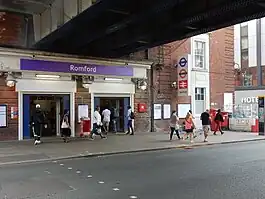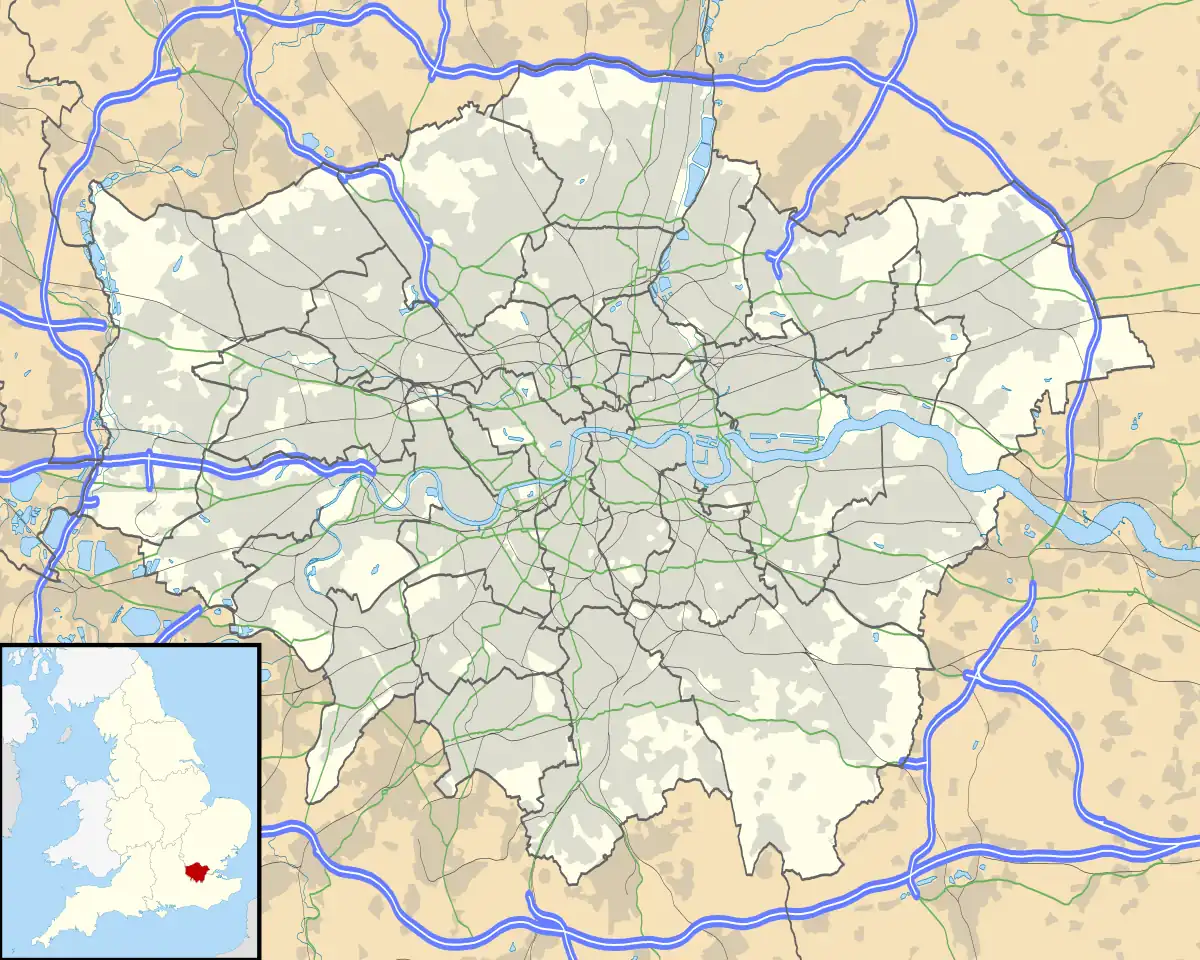| Romford | |
|---|---|
 Station entrance seen in June 2022 | |
 Romford Location of Romford in Greater London | |
| Location | Romford |
| Local authority | London Borough of Havering |
| Managed by | Elizabeth line |
| Owner | Network Rail |
| Station code | RMF |
| DfT category | C2 |
| Number of platforms | 5 |
| Accessible | Yes[1] |
| Fare zone | 6 |
| National Rail annual entry and exit | |
| 2018–19 | |
| – interchange | |
| 2019–20 | |
| – interchange | |
| 2020–21 | |
| – interchange | |
| 2021–22 | |
| – interchange | |
| 2022–23 | |
| – interchange | |
| Key dates | |
| 20 June 1839 | ECR station opened |
| 7 June 1893 | LTSR Upminster platform opened |
| 1934 | Stations combined |
| Other information | |
| External links | |
| WGS84 | 51°34′30″N 0°10′58″E / 51.5749°N 0.1827°E |
Romford railway station is an interchange station on the Great Eastern Main Line, serving the town of Romford in the London Borough of Havering, east London. It is 12 miles 30 chains (19.9 km) down the line from London Liverpool Street and is situated between Chadwell Heath and Gidea Park. It is also the northern terminus of a branch line to Upminster operated by London Overground. Its three-letter station code is RMF and it is in Travelcard Zone 6.
The station is currently managed by the Elizabeth line. The majority of services that call at Romford are Elizabeth line, but the station is also served by off-peak Greater Anglia trains between Liverpool Street and Southend Victoria and Colchester Town.
History
East Anglia main line
From its inception, the Eastern Counties Railway (ECR) planned a route linking London and Norwich that would take it via Romford. Two routes were considered, that of the current line, and an alternative going through Ilford at Cranbrook Road, then passing near to Gidea Hall and crossing Romford Common approximately following the route of the current A12 before returning to the current railway alignment at Brentwood.[3]
When the line was constructed, the first Romford station opened on 20 June 1839 as a single island platform located to the west of Waterloo Road, and formed the eastern terminus of the initial part of the Eastern Counties Railway from Mile End. Both stations acted as temporary termini, with the line extending east to Brentwood and west to Shoreditch in 1840.
In 1844, the station was relocated to its current position, some 400 metres (1,300 ft) east of the original. Around this time, the gauge of the ECR was changed from 5 ft (1,524 mm) to standard gauge of 1,435 mm (4 ft 8+1⁄2 in). In 1860, the station was remodelled with platforms on each side of the line with access to the new station by a covered walkway from South Street to the London-bound platform and via an open slope and steps for the country-bound platform.[4] Soon after this, the goods depot, which was situated to the south of the station, was connected to the Ind Coope brewery via a tunnel under the line.[5] Other non-passenger traffic included goods for the Romford Gas Works and for cattle pens accessed from St Andrews Road,[6] which were necessary due to the cattle market held in Romford every Wednesday.[7]
The line became part of the Great Eastern Railway (GER) in 1862. It was grouped into the London and North Eastern Railway (LNER) in 1922.
Upminster branch

The construction of the Tilbury Docks in the 1850s gave expanded opportunities for rail traffic, and three proposals were made for a railway linking Romford to Tilbury. The London, Tilbury and Southend Railway (LT&S) were successful, and on 7 June 1893, the LT&S opened a station in Romford, on their line to Upminster, linking to the already existing connection from Upminster to Grays on the LT&S line to Tilbury. The LT&S had hoped to negotiate with the Great Eastern Railway to use their station, but concerns over fast trains led to the GER declining and a completely new station was built with a single platform and an entrance on the opposite side of South Street to the GER station. A footbridge was built to connect the two stations but was often closed during the day.[8]
In 1934, the entrance to the platform of the line to Upminster was closed and the access to the single platform was provided by the footbridge from the main station platforms.[9]
In May 2015, the Upminster branch line transferred from Abellio Greater Anglia to London Overground.[10]
Elizabeth line
In the 1930s increasing traffic on the line led to two additional tracks and platforms being added by the LNER on the north side, the line having been quadrupled to a point west of Romford previously in 1901.[11]
Electric trains started on the line from Liverpool Street to Shenfield in 1949, giving Romford 15 trains per hour to London during peak hours, and 6 trains per hour off-peak, a pattern that continued for over half a century.[12]
In May 2015, the regular Shenfield stopping service transferred to TfL Rail.[13]
In 2017 new Class 345 trains began entering service as Crossrail partially opened under the TfL Rail brand. Platforms 2 to 5 were extended from their length of between 179 metres (196 yd) and 182 metres (199 yd) to accommodate the Crossrail trains, which are over 200 metres (220 yd) long. New lifts, signage, help points, customer information screens and CCTV were installed.[14] The upgrade works were completed in August 2022, after delays due to the COVID-19 pandemic.[15][16]
TfL Rail services were rebranded as the Elizabeth line on 24 May 2022.
Accidents and incidents
- On 29 December 1944, one person was killed and three were injured when, in darkness and heavy fog, a Chelmsford–London service passed two signals at danger on the approach to Romford and ran into the rear of a stationary freight train. The passenger train's speed at the moment of impact was about 15 mph (24 km/h). One crew member on the goods train was killed instantly. The Chelmsford train driver was held responsible for the collision in a Ministry of War Transport report.[17]
- On 4 February 2010, two people standing on the platforms at Romford were injured when stone ballast was shed from a freight train passing through the station. Subsequent examination found that the train wagon's doors had not been properly closed when it departed from the goods yard at Acton, bound for Ipswich.[18]
Services
As of the December 2023 timetable, the typical Monday to Friday off-peak service is:[19]
Elizabeth Line
- 8 tph (trains per hour) westbound to Paddington of which 2 continue to Heathrow Terminal 5
- 8 tph eastbound to Shenfield
Greater Anglia
- 2 tph westbound to London Liverpool Street
- 1 tph eastbound to Southend Victoria[20]
- 1 tph eastbound to Colchester Town[21]
London Overground
| Preceding station | Following station | |||
|---|---|---|---|---|
| Greater Anglia | ||||
Limited Service |
||||
| Chadwell Heath towards Heathrow Terminal 5 |
Elizabeth line | Gidea Park towards Shenfield | ||
| Terminus | Romford to Upminster line | Emerson Park towards Upminster | ||
| Historical railways | ||||
| Anglia Railways | ||||
| Abandoned works | ||||
| Great Eastern Railway | ||||
Connections
London Buses routes 5, 66, 86, 103, 128, 165, 174, 175, 193, 247, 248, 252, 294, 296, 347, 365, 370, 375, 496, 498, 499, school routes 647, 648, 651, 674, 686, and night routes N15 and N86 serve the station.[23]
References
- ↑ "Step free Tube Guide" (PDF). Transport for London. April 2021. Archived (PDF) from the original on 15 May 2021.
- 1 2 3 4 5 6 7 8 9 10 "Estimates of station usage". Rail statistics. Office of Rail Regulation. Please note: Some methodology may vary year on year.
- ↑ Frost, K.A. (1978). "The coming of the railway to Romford". Romford Record. Romford & District Historical Society. 11: 17–24.
- ↑ Anderson, Paul (March 2011). "Transforming Romford". British Railways Illustrated. Vol. 20, no. 6. Bedford: Irwell Press. pp. 271–275.
- ↑ Brennand 2002, p. 41.
- ↑ Brennand 2002, p. 38.
- ↑ Crossley, H J (2002). Grandfather's Romford (2nd ed.). Romford: Ian Henry Publications Ltd. p. 8. ISBN 0-86025-524-7.
- ↑ Frost, K.A. (1979). "Romford's second railway station". Romford Record. Romford & District Historical Society. 12: 15–18.
- ↑ Brennand 2002, p. 44.
- ↑ TfL count on LOROL for support Rail Professional 28 May 2014
- ↑ Brennand 2002, p. 2.
- ↑ Glover, John (2003). Eastern Electric. Hersham: Ian Allan. pp. 43–45. ISBN 0-7110-2934-2.
- ↑ TFL appoints London Overground operator to run additional services Transport for London 28 May 2014
- ↑ "Capital's key services protected, says Johnson". The Press Association. 20 October 2010. Retrieved 21 October 2010.
- ↑ Mansfield, Ian (3 March 2021). "Romford station upgrade works during a covid lockdown". IanVisits. Retrieved 6 July 2021.
- ↑ "Passengers benefit from completion of Romford station". Crossrail. 26 August 2022. Retrieved 9 November 2022.
- ↑ Major G.R.S. Wilson (5 March 1945). "Letter from the Ministry of War Transport" (PDF) – via Railways Archive.
- ↑ "Rail Accident Report - Incident at Romford station, 4 February 2010" (PDF). Department for Transport. December 2010 – via Railways Archive.
- ↑ "Elizabeth line timetable" (PDF). Transport for London. 2023. Retrieved 8 January 2024.
Valid from Sunday 10 December 2023 until Saturday 1 June 2024
- ↑ "Timetable 1: Southend, Southminster and Shenfield to London Liverpool Street" (PDF). Greater Anglia. Retrieved 16 February 2023.
- ↑ "Timetable 2: Ipswich, Clacton, Colchester and Braintree to London Liverpool Street" (PDF). Greater Anglia. Retrieved 16 February 2023.
- ↑ "Romford to Upminster London Overground timetable" (PDF). Transport for London. Retrieved 16 February 2023.
- ↑ "Buses from Romford Station" (PDF). TfL. 1 May 2022. Retrieved 20 May 2022.
- Brennand, Dave (December 2002). Ilford to Shenfield. Eastern Main Lines. Midhurst: Middleton Press. ISBN 1-901706-974.
External links
- Train times and station information for Romford railway station from National Rail
- Excel file displaying National Rail station usage information for 2005/06 Archived 22 January 2013 at the Wayback Machine
- Old LTSR entrance after conversion